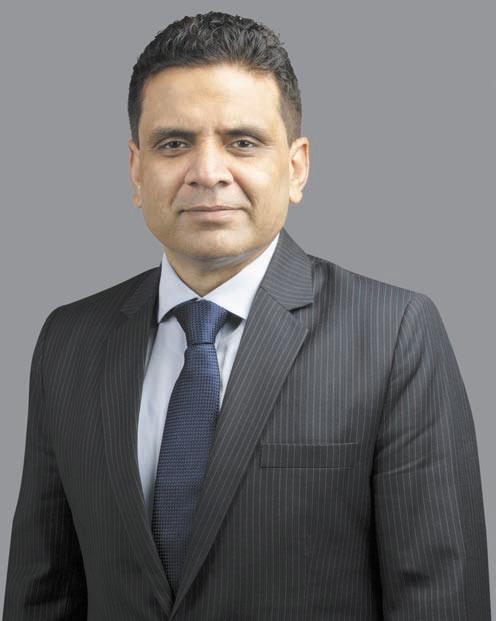The next decade won't just reward scale – it will reward speed, resilience, and reinvention
Express Pharma
|July 2025
Akash Kedia, MD - Healthcare and Lifesciences, Alvarez & Marsal India and Amit Misra, MD - Healthcare and Lifesciences, Alvarez & Marsal India, delve into the pivotal trends shaping Indian pharma. They share insights on CDMO valuations, navigating regulatory headwinds, global trade realignments, sector’s pivot towards innovation, frontier market strategies, next levers of value creation and more, in an exclusive interview with Lakshmipriya Nair

What are the biggest strategic challenges pharma companies in India are grappling with today? How is Alvarez & Marsal helping in tackling them?
India’s pharma sector is navigating a perfect storm: intensified USFDA scrutiny (over 40 inspections and multiple warning letters in FY24 alone), continued pricing pressure in US generics, and incomplete backward integration in APIs. Talent shortages in digital, compliance, and regulatory roles are adding to the challenge. Further, as the healthcare ecosystem converges, pharma companies need to focus on building capabilities in broader areas within the human health spectrum like diagnostics and medical technology. At Alvarez & Marsal, we are on the ground helping clients plot growth strategies in core and adjacent businesses, strengthen GTM, modernise operations and diversify globally, all while ensuring speed and execution. For instance, we assisted a large Indian player in integrating its speciality buy out in US and developed growth strategy for its portfolio. We are also assisting mid-sized pharma companies to grow through diversification into newer geographies and product areas.
Which sub-sectors within pharma are currently attracting the most investor interest and why?
Three clear pockets are seeing strong traction:
CDMOs like Aragen and Sai Life, for their tech-driven platforms and export-led growth.
Complex generics and injectables, where players like Gland Pharma offer more attractive margins.
Consumer health & wellness, where D2C brands like ZANDU and HealthKart are benefitting from secular demand.
What investors are chasing is platform quality, differentiated offerings, compliance robustness, and global scalability.
What macro or policy shifts could most influence pharma business strategy over the next three to five years?
यह कहानी Express Pharma के July 2025 संस्करण से ली गई है।
हजारों चुनिंदा प्रीमियम कहानियों और 10,000 से अधिक पत्रिकाओं और समाचार पत्रों तक पहुंचने के लिए मैगज़्टर गोल्ड की सदस्यता लें।
क्या आप पहले से ही ग्राहक हैं? साइन इन करें
Express Pharma से और कहानियाँ

Express Pharma
The invisible threat: Why packaging inks are the next major recall risk for pharma
Jatin Takkar, Head - Product Safety & Regulatory, Siegwerk India writes that packaging is emerging as a potential source of contamination due to unsafe ink chemistries. With global standards evolving, the industry must shift from reactive compliance to a proactive 'Safe by Design' approach that ensures packaging inks are as safe as the medicines they guard
4 mins
December 2025

Express Pharma
Beyond the machine: How intelligent packaging design elevates parenteral delivery
For sensitive parenteral products, the packaging is as critical as the drug itself. Uhlmann demonstrates how deep design competence turns packaging challenges into patient-centric solutions
2 mins
December 2025

Express Pharma
Ensuring Clean Room Integrity with Prime Clean Reset High-Speed Doors: Minimizing Air Permeability and Leakages
High-speed doors for clean rooms are specialized industrial doors essential for maintaining controlled environments.
3 mins
December 2025
Express Pharma
JULABO introduces Green Edition Refrigerated Circulators using natural refrigerants for sustainable lab cooling
JULABO launches its Green Edition range of refrigerated circulators designed to support laboratories in reducing carbon emissions, improving energy efficiency, and aligning with global environmental regulations
2 mins
December 2025
Express Pharma
Flexotherm Heating Tapes & Cords
Tempo's Flexotherm heating tapes and cords provide a safe, flexible, and efficient solution for maintaining solvent temperature across a wide range of industrial processes
1 mins
December 2025

Express Pharma
PRUV® -The original Sodium Stearyl Fumarate
JRS Pharma's PRUV® is the original sodium stearyl fumarate (SSF) introduced in the market over 20 years ago
5 mins
December 2025

Express Pharma
We continue to invest heavily in quality, regulatory compliance, and modernisation
Rishad Dadachanji, MD, Kaisha Packaging shares insights on emerging industry trends, new technologies showcased at CPhI & P-MEC, and how the Dadachanji Group is strengthening its integrated ecosystem to serve both domestic and global pharma markets
3 mins
December 2025

Express Pharma
Romaco begins local format part production in India
The Noack N 950E blister packaging machine with Indian-produced format parts to debut at CPHI & PMEC India 2025, followed by installation at the Romaco India Experience Centre in Hyderabad
4 mins
December 2025

Express Pharma
We built our business by obsessing over excipients
Shivang Zaveri, Director, Transchem Corporation Pharma; discusses Transchem's approach to excipients, innovation, and market strategy with Express Pharma.
2 mins
December 2025

Express Pharma
India is a cornerstone of Fette Compacting's global strategy
Ashok Gourish, Managing Director, Fette Compacting India, discusses India's pivotal role in the company's global growth, backed by expanded services, digital transformation support, and a strengthened Competence Center in Goa, in conversation with Express Pharma
5 mins
December 2025
Listen
Translate
Change font size

